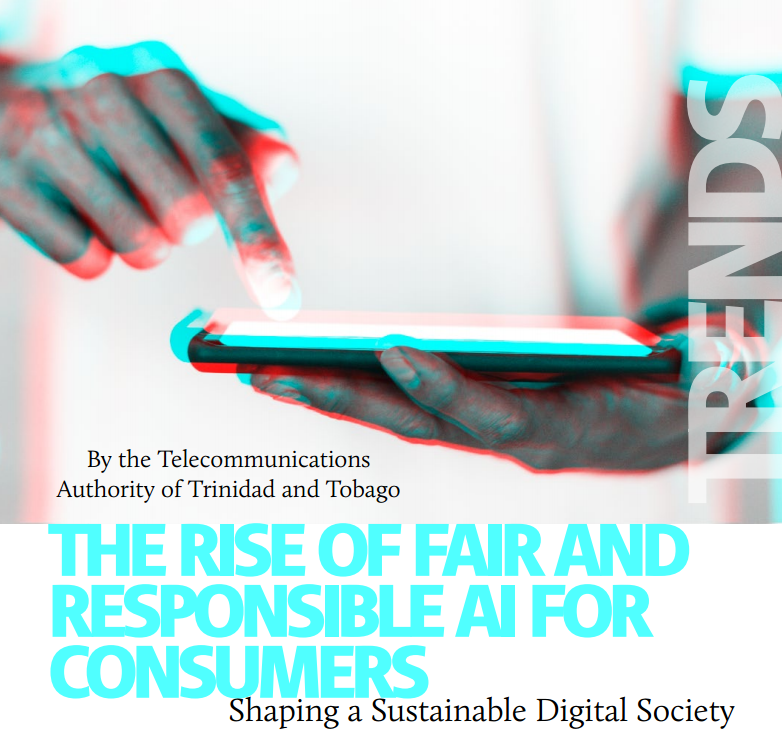The Rise of Fair and Responsible
AI for Consumers:
Shaping a Sustainable Digital Society
By The Telecommunications Authority of Trinidad and Tobago (TATT)
LINKAGE Q1 (2024) - TRENDS

A rtificial intelligence (AI) is rapidly transforming everyday life, including how we access and utilise telecommunications and broadcasting services. From personalised recommendations on streaming platforms to chatbots handling customer inquiries, AI tools offer a range of benefits to enhance user experience, streamline processes, and boost efficiency. The International Telecommunication Union (ITU) defines AI as “…a rich set of methods and disciplines, including vision, perception, speech and dialogue, decisions and planning, problem-solving, robotics and other applications that enable self-learning.”
According to the ITU, global Internet usage has surged, with approximately 5.4 billion people— equivalent to 67% of the world’s population—now connected online. This connectivity has facilitated the widespread adoption of AI-powered services, with AI expected to contribute up to $15.7 trillion to the global economy by 2030, as reported by PricewaterhouseCoopers. However, ensuring fairness, responsibility, and ethical considerations in developing, implementing, and using these tools is crucial to safeguard consumer rights and protect against potential harm.
Globally, one of the growing concerns about the ubiquitous use of AI is that consumers struggle to comprehend what kinds of personal information are being gathered and utilised about them. Privacy breaches, bias and discrimination in AI algorithms, which can perpetuate inequalities, reinforce existing societal biases and undermine consumers’ trust, have also garnered increased attention in the global discourse about fair and responsible AI. In the context of telecommunications and broadcasting sectors, this could manifest in biased decision-making processes, discriminatory pricing models, or unequal access to services.
Artificial Intelligence systems often rely on vast amounts of personal data to make informed decisions and deliver personalised experiences. However, the indiscriminate collection and use of consumer data without proper consent or safeguards can pose significant risks to privacy and security. The lack of transparency in some AI models makes it difficult for consumers to understand how it makes decisions, creating a sense of distrust and raising questions on data ownership and potential misuse of user data.
Regulators and service providers must adhere to strict data protection regulations and industry standards to safeguard consumer privacy in the age of AI. This includes obtaining explicit consent from consumers before collecting or processing their personal data, implementing robust security measures to prevent unauthorised access or data breaches, and providing clear and transparent information about how consumer data is used and shared. All of these aspects will be addressed by the passage of Trinidad and Tobago’s Data Protection legislation.
The European Union’s Artificial Intelligence Act (AI Act), which goes into effect in May 2024, tackles Europe’s concerns about AI. The AI Act provides a legal framework that provides AI developers and deployers explicit guidelines and responsibilities on particular applications of AI, such as data governance, including sensitive biometric data, cybersecurity protection, and development of applications to allow the populace to better detect AI-generated content such as deepfakes videos and images. Companies have three years to come into full compliance with the law, and failure to comply will incur exorbitant fines and the possibility of their products and services being banned within the EU.
Over the last two years, the US government has issued various executive orders advancing responsible AI development and addressing potential biases in algorithmic decision-making. The recent Customer Online Notification for Stopping Edge-provider Network Transgressions Act, or the CONSENT Act, aims to regulate the collection, usage, and sharing of US-based users’ information by edge providers. An Edge provider is a person or company that provides its services over the Internet. The Consent Act focuses on enforcing standard data security practices and after-measures for data breaches. This will significantly impact online advertising and marketing, which uses AI algorithms to identify and target consumers. Once passed, this act will require edge providers to get consent from users on an opt-in/opt-out basis for the sharing, sale and use of consumer data, ensure data security, report cases of data breaches, and notify affected consumers promptly.
The Association of Southeast Asian Nations (ASEAN) released its first framework for AI governance earlier this year and readily identified the need for distinct policy considerations and concerns because its ten member countries are on different levels of digital development.
African countries and the Caribbean region are in pursuit of changing data laws to promote AI governance. Regardless of geographical location, AI’s principles of fairness and responsibility remain universal imperatives. Regulation is essential for fostering a conducive environment where consumers can fully benefit from AI technologies while addressing concerns related to privacy, security, and accessibility due to limited know-how, algorithmic bias, and lack of transparency and explainability in AI systems. Collaborative efforts amongst governments, industry stakeholders, and civil society are essential for establishing standards and guidelines that uphold ethical AI practices and promote the well-being of consumers worldwide. With responsible development, deployment and regulation, AI can empower consumers, boost innovation, and drive economic growth.
TATT, as the regulator for the telecommunications and broadcasting sectors of Trinidad and Tobago, believes that AI should be used for the benefit of people and society in terms of increasing access to telecommunications services, provision of more efficient customer service, improvement of the quality of telecommunications services and protection of sensitive consumer data. It should consistently engender trust by being technologically sound, respectful of others’ intellectual property rights, and based on the principles of fairness, reliability, inclusiveness, transparency, accountability, privacy, safety, and security. TATT also acknowledges that a contemporary high-speed telecommunications infrastructure leveraging fibre-powered network speeds and meaningful broadband wireless technology is needed to permit AI to deliver its full benefits to the public.
Consumer public education is a key component in navigating the current AI wave to promote transparency and a better understanding of using this technology fairly, responsibly, and sustainably. One of ITU’s efforts to promote awareness amongst consumers, including the challenges and opportunities of AI, is the “AI for Good” YouTube channel at https://www.youtube.com/c/AIforGood .

TATT is also seeking avenues to raise increased public awareness of adopting AI tools for everyday life. On 15th March 2024, TATT supported the internationally recognised World Consumer Rights Day (WCRD) and this year’s theme, which is “Fair and Responsible Artificial Intelligence (AI) for Consumers”, by joining the Ministry of Trade exhibition on the Brian Lara Promenade.
On Saturday, 20th April 2024, TATT is also collaborating with CANTO, GSMA, Verizon, Equals Global Partnership, Restore A Sense of I Can (RSC), and other agencies to host a one-day online workshop titled “Tech4Girls: EmpowHERing Leadership through AI!” in support of Girls in ICT Day which seeks to encourage girls and young women to consider studies and careers in information and communication technologies (ICT). At this upcoming event, participants will learn how to effectively use Text AI tools, Text-to-Image AI tools, and Voice and Video AI tools to enhance their knowledge and skill set and make informed choices about using these technologies. Cyber safety and protecting your personal data are focused areas included in the workshop. Participants interested in attending this hands-on workshop can register at https://equals-hds.kune4u.com/caribbean2024-empowering/ .
Ensuring fair and responsible AI technologies are deployed ethically and responsibly is paramount for fostering a sustainable digital society and guides TATT’s efforts as the telecommunications and broadcasting regulator in Trinidad and Tobago. By prioritising consumer rights, ethical AI practices, and sustainable development goals whilst safeguarding consumers’ rights and freedoms, we can harness the power of AI to create a more inclusive, equitable, and empowering digital future for all.